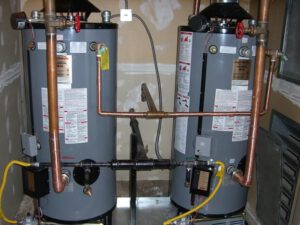If you’re not comfortable working with electrical connections or gas lines, you may want to consider a water heater installation. Professional plumbers can help you get your new water heater installed easily, and many offer same-day installation if the job is done before noon on the day of the installation. You may also be able to save money by extending your warranty, which is important for any plumbing system. Read on to get some tips to help you make the process as easy as possible.

Disconnect the hot and cold water lines from the heater. Your heater may be connected to water lines by compression fittings, union fittings, or flexible tubes. If your water heater has soldered connections, you’ll need to cut these with a tubing cutter. Turn off the power to your water heater before proceeding. Disconnect the water lines from the outlet. Remove the old water heater from the house. Once disconnected, the new water heater can be installed.
Before performing Water Heater Installation, open all the line valves. If your unit is an electric model, attach the electrical cable to the water heater’s circuit wires using a wire connector. Once you’ve secured all the lines, close all cold and hot water faucets. If your new water heater doesn’t have a vent pipe, it will be difficult to install it properly. During the Water Heater Installation, you should follow the manufacturer’s installation instructions to ensure the heater’s safety.
Proper venting is essential for efficient air circulation in water heaters. Direct venting requires a separate duct to carry the exhaust gas outside. This method is necessary for areas where the air pressure inside the house is high. Without it, the exhaust gas could draw air from the water heater into the home. Fortunately, power fans can help. It’s worth hiring a plumber to make sure you have proper ventilation. And remember that all plumbing installations must follow local building codes.
Before hiring a plumber to perform Water Heater Installation, you should consider the cost of labor. This cost may vary greatly, depending on the type of water heater, the size of the tank, and the location of the installation. Using a professional plumber can save you a lot of money, but you may be required to spend extra on additional parts and labor. Besides labor, you may also need to pay for an expansion tank, which can add anywhere from $40 to $100 to the price.
Electric tankless heaters are the best choice if you don’t have natural gas to heat your water. Although electric tankless water heaters are less efficient than gas models, they’re a great option for homes with no natural gas. Electric tankless water heater installations are another great option for energy-efficient homes. They allow you to have a constant stream of hot water, which is great for saving energy. And they’re energy-efficient too. You’ll never have to reheat cold water again.
If you’re considering installing a Water Heater, you should contact a licensed plumber to complete the work for you. Licensed plumbers can do both tank and tankless models. Licensed plumbers can also perform Water Heater Installation for customers. A plumber can help you make the right choice based on your specific needs. And remember that plumbers can refer other professionals you may need. You may also be able to save money by installing a tankless water heater if your existing tank is in bad shape.
Gas lines, meanwhile, can be extremely expensive. New gas lines and plumbing pipes need to be replaced, so this can add as much as $2,500 to $5,000 to the overall cost. Electrical wiring is another consideration. The cost of installing a new gas line is roughly equivalent to the cost of a standard tankless unit. It will require a dedicated electrical circuit, so you will need a separate electrical circuit for your water heater. For more information on Water Heater Installation, contact your local plumbing company today!
Before hiring a plumber to install your new water heater, do some research. Water heaters typically last between 7 to 15 years, so if you’re handy, this is a simple project. Just make sure you have experience with copper soldering before tackling the work yourself! If you’re not confident, consider hiring a plumber instead. Just make sure to follow all directions for safety. If you’re not sure, it could lead to a water heater fire or flood.
